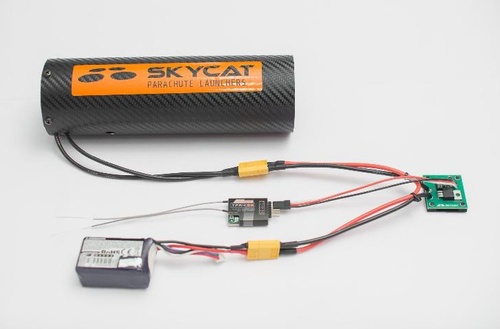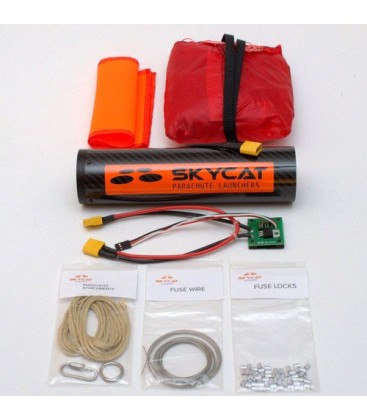No products
Skycat X55-CF, All-In-One package for 3-4 kg UAVs

We do not sell this product at the moment. You may order through Skycat's online shop.
The Skycat X55-CF launcher has the best weight / performance ratio for 3 - 4 kg aircraft compared to any parachute launcher in the world. The weight of the complete recovery system is only 320 grams, including everything! The X55-CF launcher weighs only 157 grams.
When deployed, the effective surface area of the 2.5 m2 parachute is 1.2 m2, which is almost double compared to its nearest competitor in the same weight class.
If performance matters, then this is your choice!
This is a complete Skycat parachute recovery system with the following components:
- Carbon fiber parachute launcher unit
- Opale Paramodels parachute, 2.5 square meters
- Trigger unit to be connected to battery and radio
- Fuse materials for 20 fuses
- Attachment set
Launcher data:
- Diameter 55 mm
- Length 200 mm
- 4 x M3 mounting threads at bottom
- Launcher weight: 157 grams / 0.35 pounds
- Launcher allowed temperature range -25°C - +55°C (note direct sunshine)
Parachute data:
- Parachute manufacturer canopy area 2.5m2 (equals approx. IFC-48-S)
- Copter recommended weight 3 - 4 kg
- Copter max. weight 4 kg
- Parachute weight 120 grams
The unit comes with a user manual. An instructional video about arming, disarming and parachute packing is sent upon order.
Opale parachute is rated up to 4kg UAV's by the manufacturer, when opened at free fall speed. You can use it for 4kg+ UAVs to add extra protection since full free fall with high load might not be your use case, but the manufacturer limit is 4 kilos.

Standard configuration: Launcher connected to trigger. Trigger connected to battery and 1 receiver channel. No any settings needed for trigger! Only standard radio mixing is required.
| Launcher diameter (in millimeters) | 55 |
| Launcher length (in centimeters) | 20 |
| Parachute weight (in grams) | 120 |
| Launcher weight (in grams) | 157 |
| Maximum aircraft weight (in kg) | 4 |
| Aircraft recommended weight range (in kilograms) | 3 - 4 |
| Mounting holes | 4 x M3 mounting threads at bottom |
| Launcher allowed temperature range (in °C) | -25 / +55 |
| Parachute area (in m²) | 2.5 |
| Deployment method | High energy compression spring |
| Launcher diameter (in inches) | 2.1 |
| Parachute weight (in ounces) | 4.23 |
| Maximum aircraft weight (in pounds) | 8.8 |
| Launcher length (in inches) | 7.8 |
| Launcher weight (in ounces) | 5.5 |
| Aircraft recommended weight (in pounds) | 6.6 - 8.8 |
| Launcher allowed temperature range (in °F) | -13 / 131 |
| Parachute area (in ft²) | 27 |
Radio Settings Manual
Manual explaining how to configure a FrSky Taranis transmitter to trigger the Skycat parachute.
Download (1.27M)Skycat Launcher Manual
Creating a fuse, arming, loading & mounting the launcher, transmitter setup, fail-safe setup, pre-flight check-list, maintenance.
Download (1.05M)1. How many channels does the eject require from the receiver?
- Just one channel.
2. How quickly does the parachute eject from launch command?
- The parachute ejects within 0.08 to 0.2 seconds.
3. Does Skycat parachutes uses RC servos or CO2 pressure for launch?
- No they don't.
3. If they don't use servos or pressure, what is it that makes the parachute eject?
- The patent-pending method uses a strong spring, held in tension by a fuse. Once the fuse is blown by pilot's command, the parachute gets ejected. It's a multi-use system with high reliability and short reload time.
4. Does the launch harm the battery?
- Not in any way, about 30 A is pulled from the battery for a very shot time.
5. How strongly does the launcher need to be installed on the UAV frame?
- If it doesn’t fall by itself and can withstand eject recoil, it is enough. The parachute is attached to the UAV frame directly, which avoids strong forces to the launcher itself.
6. Does the launcher carry a parachute deploy impact forces and a copter weight?
- No, it just kicks the parachute out.
7. Where is the parachute attached to the copter?
- To the strongest points of your UAV frame, using the attachment set available in the store.
8. What is the correct size of the parachute?
- It depends how big of an impact is acceptable for you. See the tables below.
Descent metrics for a 2.5 m2 and IFC-48-S parachutes
| Drone weight, kg | Descent speed, m/s | Impact energy, joules | Freefall equivalent, meters |
|---|---|---|---|
| 3.5 | 4.6 | 37 | 1.08 |
| 4.0 | 5.1 | 52 | 1.32 |
| 4.5 | 5.4 | 65 | 1.47 |
| 5.0 | 5.7 | 80 | 1.63 |
| 5.5 | 5.9 | 97 | 1.80 |
| 6.0 | 6.2 | 115 | 1.96 |
| 7.0 | 6.7 | 157 | 2.29 |
| 8.0 | 7.2 | 205 | 2.61 |
| 9.0 | 7.6 | 260 | 2.94 |
| 10.0 | 8.0 | 321 | 3.27 |
| 11.0 | 8.4 | 388 | 3.59 |
| 12.0 | 8.8 | 461 | 3.92 |
| No parachute, comparison: | |||
| 10.0 | 50.0 | 12 500 | ∞ (infinity) |
Descent metrics for a 4 m2 and IFC-60-S parachutes
| Drone weight, kg | Descent speed, m/s | Impact energy, joules | Freefall equivalent, meters |
|---|---|---|---|
| 3.5 | 3.4 | 20 | 0.59 |
| 4.0 | 4.0 | 32 | 0.81 |
| 4.5 | 4.3 | 42 | 0.94 |
| 5.0 | 4.5 | 51 | 1.03 |
| 5.5 | 4.8 | 63 | 1.17 |
| 6.0 | 5.0 | 75 | 1.27 |
| 7.0 | 5.3 | 98 | 1.43 |
| 8.0 | 5.7 | 130 | 1.65 |
| 9.0 | 6.1 | 167 | 1.90 |
| 10.0 | 6.4 | 205 | 2.09 |
| 11.0 | 6.7 | 247 | 2.29 |
| 12.0 | 7.0 | 294 | 2.50 |
| No parachute, comparison: | |||
| 10.0 | 50.0 | 12 500 | ∞ (infinity) |
9. Does the launcher ship with an automatic eject system?
- No, the pilot is responsible for launching the parachute.
10. Does launcher support an automatic eject system?
- Yes it does. Connect the trigger unit to your autopilot's PWM eject command channel and it will work.
11. Is it possible to use more than one trigger units for redundancy?
- Yes, you can connect as many trigger units as you need. For Pilot, Autopilot, Camera operator and ground station for instance.
12. Is there a Skycat parachute for DJI Inspire 1?
- Yes, the X55 all-in-one launcher is ideal for DJI Inspire 1 in size.
13. Is there a Skycat parachute for DJI S900?
- Yes, the X68 all-in-one launcher with IFC-60-S parachute is ideal for DJI S900.
14. Is there a Skycat parachute for DJI Phantom?
- Not yet.
15. Does Skycat sell a flight terminator / kill switch?
No, but their trigger unit helps if you want to make a simple one yourself. Use large enough NC relay(s) for motor power. The trigger unit can open the circuit upon an eject request. Use a Y-split from the trigger unit to control the motor relays, and to blow the launcher fuse, simultaneously.
16. May I use 6S battery with Trigger
- Officially the answer is no. However, Skycat has run lab tests using a 6S/10Ah without problems. They don't officially support 6S yet, because they haven't had a chance to perform long-term evaluations with it.





